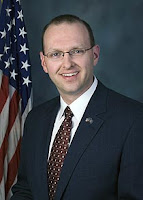Causer: Health Care is Big Challenge
By State Rep. Martin Causer
 Next to dwindling state budget revenues, one of the biggest challenges facing this Commonwealth and its citizens is access to health care.
Next to dwindling state budget revenues, one of the biggest challenges facing this Commonwealth and its citizens is access to health care.
In rural areas like ours, it can be difficult to attract doctors and specialists. It is even more challenging to keep them once they get here. Unfortunately, thanks to the high malpractice insurance costs in Pennsylvania, that problem is no longer unique to rural areas. Many parts of the state are struggling to keep enough doctors on hand to meet patient needs. High-risk specialists, such as OB-GYNs, are in especially short supply, and a number of hospitals have closed their maternity wards as a result.
Most of us who are fortunate enough to have good health likely take for granted that if and when we do get sick, we’ll just go to the doctor or the hospital and be as good as new. But talk to anyone who’s had serious health problems and you’ll likely learn that we should not assume the care we need will be available.
In Harrisburg, there’s been quite a lot of talk about health care over the past two years, but not enough action. I sincerely hope that changes in the new legislative session.
First and foremost, I believe we need to extend the MCare abatement program that helps make malpractice insurance more affordable to doctors and keeps them practicing in our state. The abatement is funded by money paid by doctors into the MCare fund, so there is no impact on our state budget. The governor has refused to extend this program until lawmakers approve his very costly plan to “cover all Pennsylvanians.” I oppose this plan because we cannot afford it and broad-based, state-sponsored health care plans simply do not work.
However, I do recognize that while our Commonwealth has one of the lowest rates of uninsured people in the nation, there are still people in need of coverage. The CHIP program has provided an important safety net for children, and adultBasic could serve that role for adults. I would consider supporting an expansion of the adultBasic to cover the 50,000 or so people already on the waiting list who cannot get coverage elsewhere. We should also consider sliding scale premiums that would be based on a person’s income in order to enroll more people who cannot obtain coverage elsewhere.
Finally, we must take steps to make it more affordable for the private sector to continue providing health care benefits to employees by encouraging the use of Health Savings Accounts, wellness tax credits and establishment of a basic but affordable health benefit plan that small businesses can afford to offer employees.
With this prescription, we can better ensure the health of our citizens.
 Next to dwindling state budget revenues, one of the biggest challenges facing this Commonwealth and its citizens is access to health care.
Next to dwindling state budget revenues, one of the biggest challenges facing this Commonwealth and its citizens is access to health care.In rural areas like ours, it can be difficult to attract doctors and specialists. It is even more challenging to keep them once they get here. Unfortunately, thanks to the high malpractice insurance costs in Pennsylvania, that problem is no longer unique to rural areas. Many parts of the state are struggling to keep enough doctors on hand to meet patient needs. High-risk specialists, such as OB-GYNs, are in especially short supply, and a number of hospitals have closed their maternity wards as a result.
Most of us who are fortunate enough to have good health likely take for granted that if and when we do get sick, we’ll just go to the doctor or the hospital and be as good as new. But talk to anyone who’s had serious health problems and you’ll likely learn that we should not assume the care we need will be available.
In Harrisburg, there’s been quite a lot of talk about health care over the past two years, but not enough action. I sincerely hope that changes in the new legislative session.
First and foremost, I believe we need to extend the MCare abatement program that helps make malpractice insurance more affordable to doctors and keeps them practicing in our state. The abatement is funded by money paid by doctors into the MCare fund, so there is no impact on our state budget. The governor has refused to extend this program until lawmakers approve his very costly plan to “cover all Pennsylvanians.” I oppose this plan because we cannot afford it and broad-based, state-sponsored health care plans simply do not work.
However, I do recognize that while our Commonwealth has one of the lowest rates of uninsured people in the nation, there are still people in need of coverage. The CHIP program has provided an important safety net for children, and adultBasic could serve that role for adults. I would consider supporting an expansion of the adultBasic to cover the 50,000 or so people already on the waiting list who cannot get coverage elsewhere. We should also consider sliding scale premiums that would be based on a person’s income in order to enroll more people who cannot obtain coverage elsewhere.
Finally, we must take steps to make it more affordable for the private sector to continue providing health care benefits to employees by encouraging the use of Health Savings Accounts, wellness tax credits and establishment of a basic but affordable health benefit plan that small businesses can afford to offer employees.
With this prescription, we can better ensure the health of our citizens.

.jpg)

Comments